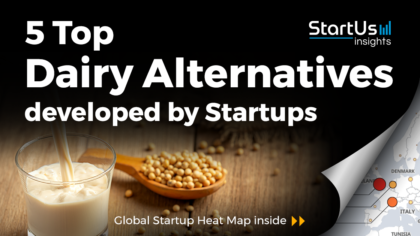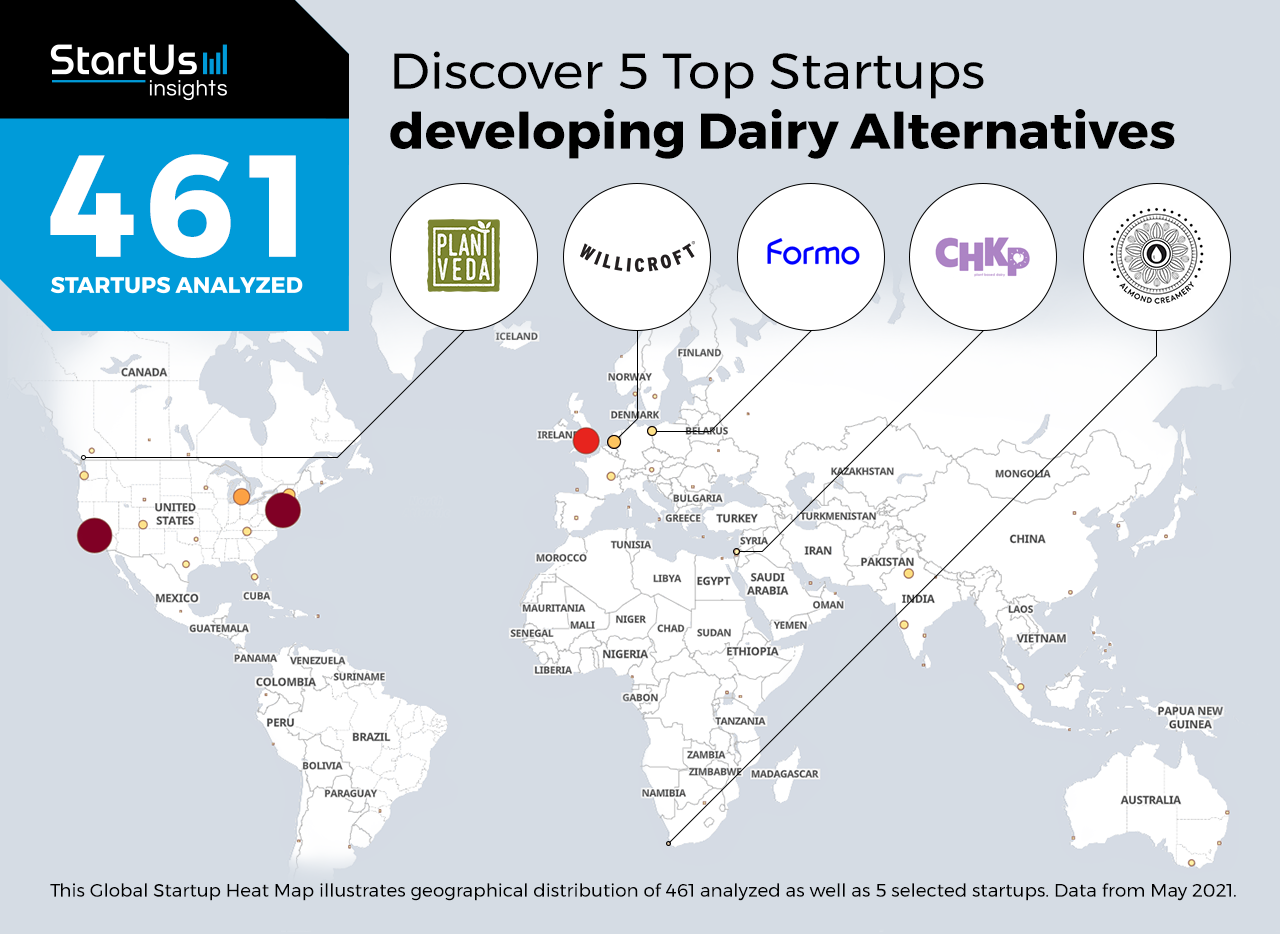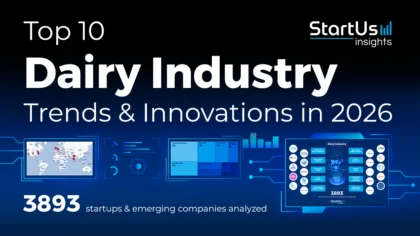Accelerate Productivity in 2025
Reignite Growth Despite the Global Slowdown
Staying ahead of the technology curve means strengthening your competitive advantage. That is why we give you data-driven innovation insights into the food industry. This time, you get to discover 5 hand-picked startups developing dairy alternatives.
Global Startup Heat Map highlights 5 Top Dairy Alternatives out of 461
The insights of this data-driven analysis are derived from the Big Data & Artificial Intelligence-powered StartUs Insights Discovery Platform, covering 2.093.000+ startups & scaleups globally. The platform gives you an exhaustive overview of emerging technologies & relevant startups within a specific field in just a few clicks.
The Global Startup Heat Map below reveals the distribution of the 461 exemplary startups & scaleups we analyzed for this research. Further, it highlights 5 FoodTech startups that we hand-picked based on criteria such as founding year, location, funding raised, and more. You get to explore the solutions of these 5 startups & scaleups in this report. For insights on the other 456 dairy alternatives, get in touch.
CHKP produces Dairy Alternatives from Chickpeas
Across the globe, people suffer from milk allergies, lactose intolerances, or hypercholesterolemia. Since dairy products form part of many staple diets globally, it becomes very tough to eliminate their use. However, there is a growing need to find dairy substitutes to avoid preventable health complications. To fulfill the demand of consumers sensitive to dairy, startups create seed-derived alternatives that offer the same level of nutritional value.
CHKP is an Israeli startup developing dairy alternatives from chickpeas. Chickpea seeds are rich in protein and have great nutritional value. By providing similar taste, texture, and nutritional value to dairy products, the startup enables people to go dairy-free. The startup offers different products such as milk, yogurt, creamer, yogurt, cream cheese, and pudding.
Almond Creamery offers Dairy-free Nut-Milk
Dairy consumption has increased drastically over the last few decades and is expected to increase multifold over the next two decades. Offering people an equally delicious and healthy alternative, like nut-based milk, has the potential to reduce dairy consumption. Nuts are rich in protein, fiber, and fats, prompting emerging companies to produce drinks derived primarily from nuts. For example, cashew, walnut, and almond milk are already popular alternatives to dairy available in retail stores globally.
With their diverse range of nut milk, Almond Creamery, based in South Africa, produces healthy and eco-friendly milk alternatives. The startup uses dates, 100% cocoa powder, and natural spices to add flavor to their drinks. Rich in omega-3 fatty acids, their milk is also preservative-free and made of natural plant-based ingredients. Further, with less than 5g of sugar per 100ml, the startup’s milk products are low in carbohydrates.
Willicroft develops Plant-based Cheese
Dairy farming contributes to climate change in multiple ways, including through emissions of harmful gases such as methane, nitrous oxide (NO), and carbon dioxide (CO2). With clear evidence available about the dairy sector’s significant contribution to greenhouse gas (GHG) emissions, there is a need for modern and innovative solutions to meet society’s dairy needs. Cheese is one such dairy item that is widely consumed and loved, for which startups are producing cheese from a non–dairy ingredients such as soy, tree nuts, seeds, and coconut.
Dutch startup Willicroft makes plant-based cheese. The startup produces a variety of cheese from plant derivatives. For instance, their feta is made with white beans and cream cheese from tofu. Currently, they are in the process of converting their cashew-based recipes to bean-based. The startup minimizes its carbon footprint throughout its supply chain with a planet-friendly ingredient base and sustainable packaging.
Plant Veda makes Cashew-based Probiotic Lassi
The consumption of saturated fats increases the risk of heart disease, breast cancer, and prostate cancer. Milk and other dairy products are some of the top sources of saturated fat in human diets. As a result, for a healthy lifestyle, people are increasingly moving to plant-based alternatives. Startups across the world create organic substitutes that look and taste like dairy but are dairy-free.
Plant Veda is a Canadian startup that crafts a range of plant-based food and beverages. They offer vegan products and use minimal preservatives while production. For example, their flavored lassi uses raw cashews, gluten-free oats, pea protein, antioxidant-rich strawberries, and blueberries, as well as natural maple-based sweeteners. Further, the startup’s beverage is cultured with billions of live good-for-the-gut probiotics.
Legendairy Foods produces Animal-free Cheese
The dairy industry continues to employ practices that are considered animal cruelty. Animal rights organizations have persistently highlighted animal abuses time and again. Such unethical practices further result in habitat loss, which, in turn, impacts the local ecosystem and disturbs the biodiversity of the planet. Increasingly, consumers look for products that are animal cruelty-free, or even products that do not use animal-derived materials. One example of startups catering to this demand includes using fermentation processes to develop milk proteins.
Legendairy Foods is a German startup combining science, technology, and food to make animal-free cheese. The startup’s six-step approach starts by equipping microorganisms with the genetic information they need to synthesize milk proteins. It then nurtures these microorganisms in optimal growth conditions in the presence of fermenters to produce milk proteins. Lastly, the startup harvests these milk proteins and combines them with plant-based fats, carbohydrates, and salts to create a concentrate. This concentrate is finally converted into curd, which is the final component to make cheese.
Discover more Food Startups
Food startups such as the examples highlighted in this report focus on alternative proteins, plant-based food as well as 3D printing. While all of these technologies play a major role in advancing the food industry, they only represent the tip of the iceberg. To explore more food technologies, simply get in touch to let us look into your areas of interest. For a more general overview, you can download our free Food Innovation Report to save your time and improve strategic decision-making.



![7 Top 3D Food Printing Companies and Startups to Watch [2026]](https://www.startus-insights.com/wp-content/uploads/2025/08/3D-Food-Printing-Startups-SharedImg-StartUs-Insights-noresize-420x236.webp)




